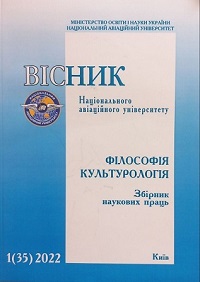AXIOLOGICAL DIMENSION OF THE FOURTH INDUSTRIAL REVOLUTION
DOI:
https://doi.org/10.18372/2412-2157.35.16543Keywords:
value, culture, information society, information technologies, industrial revolutionAbstract
Introduction. Current changes in the spheres of production and interpersonal relations lead to the transformation of the value
system. The choice of the theme is dictated by optimistic forecasts of K. Schwab of value transformations in the public
consciousness in his work "Fourth Industrial Revolution". The aim of the article is a philosophical analysis of the value
transformations of the information society due to global changes in recent decades. Research methods of this work are
philosophical and general scientific methods, sociocultural, systemic, and synergetic approaches. Research results. In the
philosophical literature, there is a vagueness of criteria for classifications of values. Values are able to become a self-sufficient
subject of human interests and aspirations which leads to their absolutization. But in the lives of individuals, countries, and peoples
there are other worldview crises - then there is a reassessment of values. J. Lipovetsky describes the transition from the modern to
the postmodern epoch in terms of the change in value orientations. According to him, since the 1950s, American and European
society has been mainly interested in consumption, entertainment and pleasure. In the late XX c., R. Ingelgart explored the relations
between values, economics, and politics based on the World Values Survey. This study shows that neither individual nor social
values can change instantly. On the contrary, the change of values is gradual. The shift from materialistic to postmaterial priorities is
at the core of the postmodernization process. K. Schwab focuses on how technology and society coexist to make the world a better
place by taking advantage of the modern technological revolution. Changes in the socio-economic environment contribute to
transforming beliefs and values at the individual level. At the same time, it is impossible to predict the time of change of these beliefs and values with K. Schwab’s certainty. Discussion. Ukrainian researchers V. Onoprienko and L. Drotianko note the erroneousness of some forecasts and prospects for the development of the information society being the same capitalist economic model, despit the impact of digitalization on all spheres of public life. According to H. Kleshnia, interest in the problem of values always occurs in times of crisis, the search for new cultural foundations of human existence. Conclusion. At present, it is difficult to determine the trends of changes in the value system due to the fact that we are only at the origins of the fourth industrial revolution. At the same time, the analysis of the value transformations of the transition from the modern era to the postmodern era, carried out by famous philosophers and sociologists, testifies to the priority of individuality, personal freedom, and oblivion of responsibility to society. That is why optimistic forecasts of achieving social harmony during the implementation of the fourth industrial revolution look premature.
References
Дракер П. От капитализма к обществу знания. URL:http://iirmp.narod.ru/books/inozemcev/page_1067.html /.
Дротянко Л. Г. Цифровий вимір сучасного етапу цивілізаційного розвитку соціуму / Л. Г. Дротянко // Вісник Національного
авіаційного університету. Серія: Філософія. Культурологія: Збірник наукових праць. – Вип.1 (33). – 2021. – С.16-21.
Ингельгарт Р. Постмодерн: меняющиеся ценности и изменяющиеся общества / Р. Ингельгарт // Полис, 1997. – №4. – С. 18-28. URL :https://sociology.mephi.ru/docs/polit/ html/ingl.htm /.
Клешня Г. М. Роль традиційних цінностей культури у суспільному розвитку інформаційної доби / Г. М. Клешня // Вісник Національного авіаційного університету. Серія: Філософія. Культурологія. – Вип. 2(29). – 2019. – С. 135-141.
Липовецки Ж. Эра пустоты. Эссе о современном индивидуализме / Ж. Липовецки; пер. с франц. В. Кузнецова. –
СПб.: Владимир Даль, 2001.
Нестеренко В. Г. Вступ до філософії: онтологія людини : Навчальний посібник для студентів / В. Г. Нестеренко. – К.: Абрис, 1995. – 336 с.
Новейший философский словарь / Сост. А. А. Грицанов. – Мн.: Изд. В.М. Скакун, 1998.
Оноприєнко В. И. Nbics-технологии и риски обществазнания / В. И. Оноприєнко // Вісник Національного авіаційного університету. Серія: Філософія. Культурологія. – Вип. 2 (26). – 2017. – С. 12-15.
Шваб К. Четвертая промышленная революция / К. Шваб – «Эксмо», 2016 – (Top Business Awards).
Downloads
Published
Versions
- 2023-07-20 (2)
- 2022-08-12 (1)


